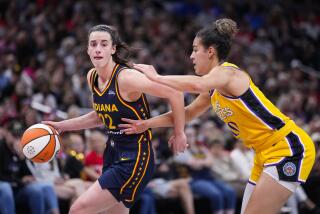Sparks Left to Pick Up Pieces
- Share via
The 2003 season challenged the Sparks like no other since they started winning WNBA championships.
They had injuries, ranging from Lisa Leslie (11 games) to Tamecka Dixon (four games) to Mwadi Mabika, which kept their starting lineup in a state of upheaval.
They had the internal and external distractions of losing reserves Latasha Byears (waived and under investigation in the alleged sexual assault of a former teammate), and Rhonda Mapp (suspended two years after failing a drug test).
Although they finished 24-10 in the regular season, the league’s second-best record, they were extended to the limit in every playoff series against Minnesota, Sacramento and Detroit.
So was it any wonder they ran out of gas trying to defend their title against the younger, stronger Shock in the finals? Or the fact they looked more drained than stunned as Detroit celebrated winning on its home floor?
“They’re a young team, full of energy,” DeLisha Milton said of the Shock. “They don’t know anything else but to play hard. A lot of them still have that college mentality, just give 110% every single time.
“We have a lot of seasoned veterans. Our starters were averaging nearly 40 minutes a game. It had to take a toll on us at some point.”
WNBA fans may rejoice that another team besides Houston and Los Angeles is the champion, if nothing else to suggest a competitive balance may be approaching.
But the Sparks also don’t want to fall into the same pit with Houston. Since winning their last title in 2000, the Comets have failed to advance beyond the first round three years in a row.
Which means Los Angeles must undergo an off-season of introspection and problem solving. The gap between the elite teams and the rest of the league closed significantly in 2003.
Dixon, for one, hopes it won’t be a major makeover.
“I don’t think we lacked any hunger this year; there definitely was a desire to get back” to the finals, Dixon said. “But sometimes when you’re so used to winning, it can lose a little bit of shine. It takes something like this to get it back.”
Still, don’t expect General Manager Penny Toler to sit quietly through the winter.
She’ll start with the bench. Without Byears and Mapp, Toler worked with stopgaps this season, from Vanessa Nygaard and Lynn Pride to free-agent signee Jennifer Gillom.
Rookie guard Shaquala Williams had some moments. Rookie Chandra Johnson had brief cameos before going on the injured list in late August for good.
Gillom never looked comfortable in the Sparks’ up-tempo style.
She is 39 and, while still strong, doesn’t seem to be part of the team’s future.
Nygaard, who joins the women’s basketball coaching staff at Long Beach State, also needs to decide how much longer she wants to play. Pride, primarily a defender and a rebounder, plays with the kind of energy and resolve Coach Michael Cooper likes.
There also remains the specter of Jackie Stiles, whom the Sparks selected from the dispersal draft, and who sat out the year for further surgery. The Sparks were willing to wait on her, and she could give them some of the bench scoring they lacked this year. Stiles agreed to let the Sparks keep her rights even though she was not on the payroll, but she has to show she can compete for a roster spot.
The starting five of Leslie, Dixon, Mabika, Milton and Nikki Teasley is entrenched thanks to the long-term contracts Toler negotiated under the new salary cap before the season. What remains to be seen is whether Toler can convince her starters to avoid long winter seasons in Europe. Milton and Mabika, both of whom played on teams that reached the European championship game, were dragging noticeably the first third of the season.
“Now everybody’s got to go home and get ready for next year,” Mabika said. “Can we win again next year? I don’t know. I don’t know what kind of team they’re going to have. We are going to have to make some adjustments.”
Toler figures to get one and maybe two good prospects from the fertile 2004 college draft. And no one knows who will be available on next year’s free-agent market, although teams will probably have a better idea how to work the salary cap, which rises from $622,000 to $647,000.
Then there’s Cooper.
For all his public pronouncements about how strong the WNBA is becoming as a league, Cooper takes losing hard -- even when there are legitimate reasons why it happened.
He also believes that most coaches have a shelf life with their teams. He has been a benevolent taskmaster with the Sparks since taking over in 2000 and has guided the team to unparalleled heights. But this is the first time he has lost a title with this group. Whether he says so or not, he will consider this winter whether the Sparks will still willingly do whatever he asks, or whether they start to question -- by words or actions -- if the price is too high.
Add to the mix the interest by the NBA. There have been feelers by Denver and Toronto the last couple of years. Cooper, who still has another year on his contract, says he isn’t in a hurry to leave and Spark owner Jerry Buss is satisfied with the job Cooper has done. But Cooper can get out of the contract with an NBA offer.
The only thing Cooper wanted to talk about Wednesday is what the Sparks did accomplish this year.
“One of the hardest things to do once you win a title is to get back there and defend it,” Cooper said. “We did that; we just came up against a team that was a little hungrier and fresher. [The Shock] had never been tested like we tested them, but they had the energy to win.”


